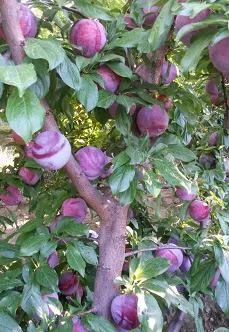Last week the Women on Farms Project, an NGO focusing on the working conditions of female farmworkers, particularly in the Western Cape, marched to Parliament to call for a ban on 67 pesticides used in the wine and fruit sectors. They also handed over a memorandum signed by concerned German consumers.
The organisation says that its research among women working on wine and fruit farms, particularly vulnerable seasonal workers, found a very high number of respondents (73% of their sample) who claimed not to have been issued with protective clothing before working with pesticides. In its press release, the NGO refers to cases of seasonal workers developing respiratory health problems as an alleged result of their exposure to pesticides on farms.
A plum orchard in the Boland
AgriSA, an agricultural federation, has reacted to these allegations: “The Occupational Health and Safety Act is prescriptive and very clear on the handling of chemicals. Agri SA’s members are generally farmers who export their produce and must comply with strict audits that deal with the correct administration, use and storage of all chemicals used on farms.”
The response of Hortgro (umbrella body for stone, top and softfruit sectors) states: “All relevant fruit growers are aware of the risk posed by all pesticides used on their farms. Their workers have been trained, and undergo frequent refresher training by skilled and informed people, and the relevant personnel are issued with the necessary protective clothing.”
“Furthermore, it is against the law to maintain worker housing in such close proximity to orchards that people come into direct contact with chemical products during application. Implementation of buffer zones to avoid exposure of sensitive areas to chemical products is prescribed by all the production standards such as GLOBAL GAP and others with which fruit growers have to comply.”
Hortgro continues: “Fruit farms require specially trained orchardists, and as a work corps, they are a valued part of farming enterprises.”
Annual audits verify their adherence to these standards and the absence of certification automatically closes the doors of markets like the EU and the UK.
Registered pesticides The Women on Farms project's press release makes specific reference to Paraquat, Roundup, Dormex and Dursban pesticides which it calls “a major health risk” to workers on wine and fruit farms. Hortgro confirms that these pesticides are registered for use in South Africa.
The Women on Farms project's press release makes specific reference to Paraquat, Roundup, Dormex and Dursban pesticides which it calls “a major health risk” to workers on wine and fruit farms. Hortgro confirms that these pesticides are registered for use in South Africa.
“Dormex is registered for use in South Africa on most deciduous fruit (apricots; plums; cherries; pears; apples; table grapes). It is used as a dormant application only (when there are no leaves on trees) [growth regulant for delayed foliation in apples, apricots, plums, cherries, wine and table grapes/other; advancement of budding in sultana grapes],” Hortgro explains. “Dursban, an insecticide, is registered for use in South Africa on all deciduous fruit; used as dormant application only.”
The herbicides Paraquat and glyphosate are applied for weed control.
The fruit industry subscribes to the highest international standards, Hortgro says, without which the export of fruit would not be possible to discerning international markets (with the same requirements applying for the local market).










